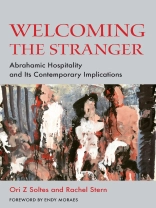Embracing hospitality and inclusion in Abrahamic traditions
One of the signal moments in the narrative of the biblical Abraham is his insistent and enthusiastic reception of three strangers, a starting point of inspiration for all three Abrahamic traditions as they evolve and develop the details of their respective teachings. On the one hand, welcoming the stranger by remembering “that you were strangers in the land of Egypt” is enjoined upon the ancient Israelites, and on the other, oppressing the stranger is condemned by their prophets throughout the Hebrew Bible.
These sentiments are repeated in the New Testament and the Qur’an and elaborated in the interpretive literatures of Judaism, Christianity, and Islam. Such notions resonate obliquely within the history of India and its Dharmic traditions. On the other hand, they have been seriously challenged throughout history. In the 1830s, America’s “Nativists” sought to emphatically reduce immigration to these shores. A century later, the Holocaust began by the decision of the Nazi German government to turn specific groups of German citizens into strangers. Deliberate marginalization leading to genocide flourished in the next half century from Bosnia and Cambodia to Rwanda. In the aftermath of September 11, 2001, the United States renewed a decisive twist toward closing the door on those seeking refuge, ushering in an era where marginalized religious and ethnic groups around the globe are deemed unwelcome and unwanted.
The essays in Welcoming the Stranger explore these issues from historical, theoretical, theological, and practical perspectives, offering an enlightening and compelling discussion of what the Abrahamic traditions teach us regarding welcoming people we don’t know.
Welcoming the Stranger: Abrahamic Hospitality and Its Contemporary Implications is available from the publisher on an open-access basis.
Published by The Fritz Ascher Society for Persecuted, Ostracized and Banned Art and the Fordham University Institute on Religion, Law and Lawyer’s Work
Mục lục
Image List | vii
Foreword | xi
Endy Moraes
Preface | xv
Ori Z Soltes and Rachel Stern
Introduction | 1
Section One: Building on the Past: Theology, History, and Their Practical Implications | 9
1 Welcoming the Stranger in the Jewish Tradition | 11
Ori Z Soltes
2 Hospitality in Christian Traditions: A Key Virtue and its Applications | 27
Thomas Massaro
3 A Migrant 4 Life Journeys to the New Tower of Babel: Christianity and Immigration | 43
Craig Mousin
4 Welcoming the Stranger in Islam: Abrahamic Hospitality and Contemporary Implications | 72
Zeki Saritoprak
5 Epilogue: India and the Dharmic Traditions of Hospitality | 82
Ori Z Soltes
Section Two: Building the Present and Future: Programmatic Ideas and Realizations | 95
6 Fritz Ascher: A Jewish Artist in Germany | 97
Rachel Stern
7 Welcoming Beyond Offering Safe Heaven: Aspiring to Partner with Refugees | 125
Carol Prendergast
8 De-story to Destroy, Re-Story to Restore | 137
Mohsin Mohi-Ud-Din
9 Immigration Courts in Need of an Article I Overhaul | 155
Mimi Tsankov
10 Epilogue: Future Strangers: Digital Life and Hospitality To-Come | 159
Lindsay Anne Balfour
Conclusions : An Unfinished Epilogue | 177
Ori Z Soltes
Bibliography | 181
Author Biographies | 189
Index | 193
Giới thiệu về tác giả
Mohsin Mohi-Ud-Din is an artist, activist, and founder of the global nonprofit #Me We International Inc. (#Me We Intl). #Me We Intl is a global network of artists, scientists, and community-builders who design methodologies and tools for creative expression and communication skills-building to advance the health, human rights, and representation of everyone. For over 15 years, Mohsin has scaled his methodology across more than 15 countries, from the valley of Kashmir to the Syrian refugee camps in the Middle East, to the mountains of Morocco, Honduras, and Mexico. His movement has supported more than 8, 000 vulnerable youth and caregivers and dozens of community building organizations fighting violence, forced displacement, incarceration, and poverty. Mohsin previously worked for human rights organizations such as Human Rights First, and worked in the Strategic Communications Division for the MDGs and SDGs for the United Nations in New York. His work has received honors from SOLVE MIT at the UN, the United Nations Alliance of Civilizations, Open Ideo and others. In 2009, Mohsin received a Fulbright Scholarship to pilot his methodologies in Morocco. His words and visual pieces have been featured in VICE News, Al Jazeera, Huffington Post, and The Nation. Instagram: @meweinternational | Twitter: @Mohsindin and @Me We Intl







![Bìa của Brian Schrag & Julisa Rowe: Community Arts for God's Purposes [Chinese] 貼近神心意的社群藝術 Bìa của Brian Schrag & Julisa Rowe: Community Arts for God's Purposes [Chinese] 貼近神心意的社群藝術](https://static.worldofdigitals.com/thumb_webp/740/9781645083740.webp)




